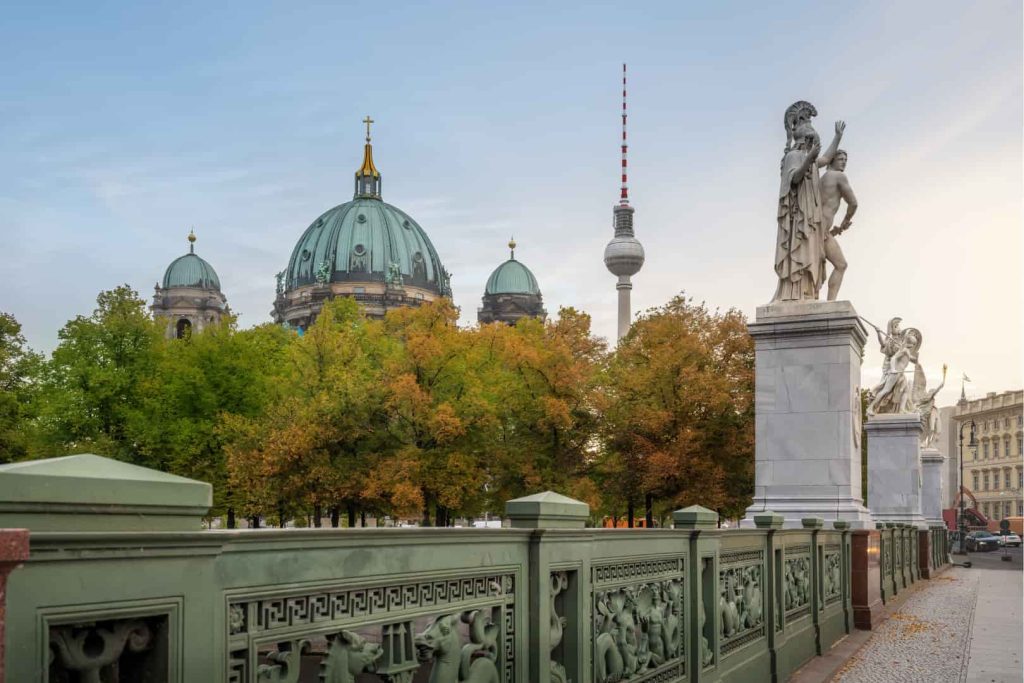Did you know that over 49 German universities rank among the world’s best? Freiburg, for instance, is known for its environmental science program, while Göttingen’s Nobel laureate heritage demonstrates the university’s dedication to research excellence. From RWTH Aachen’s engineering expertise to TU Berlin’s burgeoning startup scene, German Universities are hubs of innovation, attracting global talent and forging the future. In this blog, let’s discuss the top 15 universities in Germany that are renowned around the world and their reasons for being so.
These top universities in Germany are ranked based on factors like academics, programs and specializations, reputation, student ratio, research impact, international diversity, and innovation.
15) University of Cologne

Founded in 1388, the University of Cologne is one of the oldest universities in Europe. This top-ranked university in Germany houses six faculties – Management, Economics and Social Sciences, Law, Medicine, Arts, Mathematics and Natural Sciences, and Human Sciences, each offering a wide range of courses. With over 48,000 students, it ranks as one of the largest universities in Germany. As a leading university in national and international rankings, the University is renowned for its excellent research capabilities, particularly in economics and law. The university strongly emphasizes providing students with practical experiences, particularly in the Faculty of Economics and Social Sciences.
How to Apply:
To apply for a Master’s program at the University of Cologne, start by reading the program-specific details, especially regarding admission criteria and required documents. If you earned your degree outside Germany, you’ll need a preliminary review documentation (VPD) from uni-assist. Apply through the KLIPS system; no paper documents are needed. You can apply to three programs yearly. Pay attention to various deadlines, for example, mid-January to March 31 for some programs and April to June 15 for others. After applying, the university will review your application and conduct a selection process if needed. For more detailed information, visit the University of Cologne’s application guide.
14) Karlsruhe Institute of Technology (KIT)
KIT was founded in 1825 as a polytechnical school inspired by the École Polytechnique in Paris. With time, it developed into a university specializing in technology and engineering. KIT is recognized as a leading German institution in computer science. In 1966, the school established one of the first central computer laboratories; in 1969, a department dedicated to informatics was created. The institute has won 6 Nobel Prize laureates and nine Leibniz Prize winners among its alumni and faculty. It is also the home of notable inventors and entrepreneurs like Heinrich Hertz and Karl Friedrich Benz.
As a member of the TU9 (an association of the largest and most notable German institutes of technology), this top German University is popular for its top-notch research, especially in science-based mechanical engineering.
How to Apply:
Use KIT’s Online Application Portal to apply. Once the application is completed, send the printout and required records to KIT’s international office. The university operates on a semester-based application calendar with two intake sessions – one in summer and one in winter. Admission requirements include a filled-up application form, academic transcripts, a letter of recommendation (LOR), a Statement of Purpose (SOP), and a GPA of 3.0 out of 4.0 (equivalent to 83% to 86%). Further, attach a CV/Résumé, proof of sufficient financial resources to study and live in Germany, and evidence of minimum required scores that show proficiency in both the German and English languages.
13) Technische Universität Berlin
TU Berlin originated from the Royal Trade Academy and the Royal Building Academy merger in 1879. The university was the first to offer a degree in Industrial Engineering and Management in 1926/27. Like KIT University, TU Berlin is also a part of TU9, participating in the Top International Managers in Engineering network, opening doors to extensive student exchanges. With almost 34,000 students (among which a large proportion are international students), TU is one of the largest technical universities in Germany and has been recognized as a “University of Excellence.”
How to Apply:
If you possess a unique qualification and aim to apply for a bachelor’s program at TU Berlin, check out this step-by-step guidance. Please note that all bachelor programs at TU Berlin are taught in German and require a German language certificate at level C1. If you are looking to apply for a master’s program, this official website covers that.
12) Universität Hamburg
Established in 1919, the University of Hamburg was the first German university based on democratic principles. The university has produced several Nobel Prize winners, including Klaus Hasselmann, Otto Stern, Wolfgang Pauli, and Isidor Rabi. It offers more than 170 degree programs across eight faculties. The University of Hamburg is one of Germany’s largest universities with almost 44000 students, of which 6000 are international students from over 130 countries. The university earned clusters of excellence in photon and nanosciences, manuscript research, climate research, and the quantum universe.
How to Apply
To apply for a Master’s program at Universität Hamburg, you can submit your application online during specified periods: December 1 to January 15 for the summer semester, and June 1 to July 15 for the winter semester. International Master’s programs have a different timeline, from February 15 to March 31. The process involves completing an online form and, for many programs, sending required documents by post or email by the deadline. Some programs may not require documents for the initial application but might request them later if needed for clarification. For more information and specific details, visit the university’s official page on applying for Master’s programs: Universität Hamburg Master’s Application.
11) University of Freiburg

Founded in 1457, the University of Freiburg is one of the oldest universities in Germany, with a history going back to the Middle Ages. The university has connections with 22 Nobel laureates, who are associated as alumni, faculty, or researchers. Freiburg comprises 11 faculties, offering degree programmes in theology, mathematics, physics, biology, chemistry, pharmacy, geosciences, forestry, computer science, and microsystems engineering. It has an established research profile, with 15 academics having been awarded the prestigious Gottfried Wilhelm Leibniz Prize. The university consistently ranks high in various prestigious rankings, including the Shanghai Ranking, where it ranks among the top universities globally.
How to Apply:
Applying to the LAS program at University College Freiburg involves a few steps. Start by registering on hochschulstart.de, then apply through the Uni Freiburg portal, selecting “Liberal Arts and Sciences” as your desired program. You’ll need to submit an application essay, a letter of motivation, proof of B2 English proficiency, and your university entrance qualification. The process includes a student orientation procedure and ends with the university’s selection process. For a detailed guide, check out the university’s official application page: University College Freiburg – Application & Admissions.
10) University of Göttingen
Founded in 1737, Göttingen boasts a rich campus with several historic buildings, including the iconic Auditorium Maximum (where Gauss famously proved his quadratic reciprocity theorem). This top German university offers 13 faculties and over 150 courses that are facilitated by research-oriented teaching. Göttingen University has been affiliated with 44 Nobel laureates, including Max Planck, Otto Hahn, and Werner Heisenberg, giving it global standing in the fields of science and mathematics. With its massive 7,000 hectare forest for research, recreational, and other study purposes, this top German University stands as an attractive option for students.
How to Apply
To apply for the LLM program at the University of Göttingen, you need a Bachelor’s degree in law or a related field and one year of relevant experience. English proficiency is required, demonstrated by TOEFL or IELTS scores. The application includes filling out a form and submitting a CV, diplomas, and test certificates. Early applications are encouraged for advantages like a discounted tuition fee. For more details, check the university’s application guide.
9) Freie Universität Berlin
Freie Universität Berlin, founded in 1919 (as a “free university”), was and is dedicated to academic freedom and critical thinking. The university is home to 22 Nobel laureates, including Max Planck, Albert Einstein, and Heinrich Heine. This top German university consistently appears in the top 100 universities in the world. Being committed to internationalization, the university has over 40,000 students, of which 40% come from outside Germany, creating a diverse learning environment. Freie Universität offers 180 bachelor’s and master’s programmes and around 50 doctoral programs. Further, with over 200 student organizations and clubs, this university is a great choice for local and international students.
How to Apply
To apply to Freie Universität Berlin with a non-German degree for a Master’s program, you’ll need to use the uni-assist online application form. Make sure to include all necessary documents, such as your graduation certificate, transcripts, proof of language proficiency, and any program-specific requirements. Applicants from China, India, or Vietnam must also provide certification from an Academic Evaluation Centre. Check the uni-assist portal for a detailed list of required documents and submit your application within the specified deadlines. For more information, visit Freie Universität Berlin’s Application Guide.
8) University of Tübingen

Founded in 1477, Tübingen is one of Germany’s ancient universities. This university is world-famous for its academic excellence and consistently ranks among Germany’s top universities. Known for its excellence in humanities, law, and medicine, the university has also contributed greatly to scientific breakthroughs, including the discovery of DNA in 1868. This top German university’s seven faculties offer more than 200 courses. This lively place (full of clubs, cultural events, open-air concerts, and festivals) is an academic ground for over 28,000 students from over 100 countries.
How to Apply
Apply for the University of Tübingen by identifying you right category, such as German nationals with a higher education entrance qualification or international students. Then, follow the specific application and enrollment guidelines provided for your category. For detailed information on the application process, including necessary forms and contact details for assistance, please check University of Tübingen’s Application and Enrollment page.
7) Charité – Universitätsmedizin Berlin
Charité Universitätsmedizin Berlin, founded in 1710, is one of the largest university hospitals in Europe. Charité has four major campuses across Berlin: Mitte, Benjamin Franklin, Virchow Klinikum, and Berlin Buch. Each campus offers exceptional medical services that contribute to its widespread presence and influence in Berlin’s healthcare system. Charité is world-renowned for its historical contribution to medical science. As per this top German university, almost 9,485 students are enrolled in degree courses.
More than half of the German Nobel Prize winners in medicine and physiology have been affiliated with Charité. In addition, Charité stands as one of the largest employers in Berlin, with around 21,556 employees from 121 countries. With its ample resources and top-notch amenities, Charité Universitätsmedizin stands as the top option for a medical degree in Germany.
How to Apply
To apply for the International Master’s Program in Molecular Medicine at Charité, start by creating a profile and filling out the application form online. Then, upload your necessary documents, such as transcripts and language test results. Include a motivation letter and CV, and arrange for two referees to submit their recommendations directly online. If you’re from China, India, or Vietnam, ensure to get a visa pre-check at the Academic Evaluation Centre (APS). Remember, the application deadline is May 31. For more information, visit Charité’s application page.
6) University of Bonn
Founded in 1818, the University of Bonn is known for its long history of academic excellence and research breakthroughs. Bonn consistently ranks among the top Universities in Germany with 6 Clusters of Excellence (the most of any German university) and Nobel Prizes and Field Medals. Nestled on the banks of the Rhine River, Bonn is home to over 33,000 students worldwide. The University of Bonn prides itself on its international community, which consists of students from more than 130 countries.
How to Apply
Students can start their application process online by completing the form on the official website. After submitting the form, they will get an email with a PDF attachment. They need to print, sign this PDF, and then mail it along with the necessary documents to the University of Bonn. The application must include a passport copy, a complete CV, proof of German language skills, educational qualifications, and any relevant academic records. If any documents are not in German, English, or French, officially certified translations are required. For more details, please visit the official website.
Also Read: The Free Education System in Germany
5) RWTH Aachen University
Founded in 1870 (as Prince William of Prussia decided to set up a technology institute in the Rhine Province), RWTH Aachen University is the largest university of technology in Germany and popular in Europe (and worldwide). There are over 100 courses to choose from at the nine RWTH Aachen faculties, including engineering sciences, natural sciences, geosciences, etc. The prestigious university boasts over 46,000 students (as of 2023-24), of which 29% are international students. This top German University has several research contributions and affiliated individuals, including Johannes Stark, that have earned Nobel Prizes.
How to Apply
For RWTH Aachen University, non-EU students need to take the TestAS aptitude test in German, available four times a year, including a subject-specific module related to their intended study area. You’ll also need to submit university transcripts (with ECTS if possible), show at least 12 months of work experience, provide a CV and a Letter of Intent, demonstrate English proficiency, supply two recommendation letters, present your university degree certificate, and meet GRE scores (Verbal 145, Quantitative 160, Analytical Writing. Documents not in German or English require certified translations. non-notarized copies are accepted.
4) Humboldt-Universität zu Berlin

Humboldt-Universität zu Berlin, founded in 1810 by Wilhelm von Humboldt (the man behind the teaching and research combination model of higher education), is one of Germany’s oldest and most prestigious universities. Its academic tradition is distinguished by the production of 52 Nobel laureates, 22 Fields medalists, and 12 Leibniz Prize winners. Humboldt University’s 9 faculties offer over 171 degree courses and major research activities across various fields, including scientific and academic work, to over 35,000 students from over 130 countries. With local and international students choosing the university, ranks it among the top universities in Germany and Europe.
How to Apply
Apply online at Humboldt or uni-assist during the application period. Check “Dialogorientiertes Serviceverfahren” for courses allocated by hochschulstart.de. Academic requirements include a GPA of 3.2, IB score of 33, or 80% marks. English proficiency requires TOEFL 84, IELTS 6, or PTE 58. Submit academic transcripts, language proof, a comprehensive CV, a uni-assist fee receipt, and, for EU students, a passport or ID photocopy. Postgraduates must include a Self-Assessment sheet. For more details, visit Humboldt’s application guide.
3) Heidelberg University
Heidelberg University (AKA Ruperto Carola) was established in 1386. This ancient university is widely known for its high academic standards and global reputation. Besides other major courses, Heidelberg is renowned for its influential law and modern scientific schools. The university’s broad campus is divided into two main areas: the humanities and social sciences in Old Town and medical and science-related disciplines in Neuenheim. This top German University offers 180 degree courses for local and international students, about 20% of whom are international. Heidelberg University has been the recipient of 57 Nobel Prizes and accolades, placing it among the top global universities.
How to Apply
To apply for graduate admission at Heidelberg University, start by completing an online application on their website. You’ll also need to provide a copy of your passport and demonstrate your English language proficiency. Craft a goal statement specific to your chosen graduate program and obtain the required letters of recommendation. Note that the Master of Arts in Counseling program requires three letters of recommendation. while MBA applicants are exempt from this requirement.
Additionally, submit your official university records, to ensure transcripts from U.S. schools are sent directly to Heidelberg. For records from schools outside the U.S., you must send them to a NACES-approved credential evaluation service for a course-by-course evaluation, such as SpanTran. Check out Heidelberg University’s official admission page for comprehensive instructions and program-specific requirements.
2) Ludwig Maximilian University of Munich (LMU)
Founded in 1472, LMU is home to a rich history deeply intertwined with Munich and Germany’s development. Among its alumni are Albert Einstein, Max Planck, and Thomas Mann, who have shaped science, art, and intellectual inquiry. With over 300 degree programs, LMU consistently ranks among the top universities in Germany and Europe. This university is regularly featured in the top 50 global rankings. LMW’s traditional humanities, cutting-edge robotics, and other top-notch degree programs attract high-caliber students and renowned faculty from all over the world.
With over 30,000 students from over 130 countries, LMU is truly a global university. And when it comes to Nobel Prizes and accolades, Ludwig Maximilian University of Munich (LMU) has a collection of 49 Nobel laureates representing distinguished individuals who have made significant contributions across diverse fields.
How to apply
To apply to LMU as an international student, register through the International Office and complete the online application. No application fee is required. You’ll need to provide essential documents, including certified copies of your academic qualifications, transcripts, and a certified translation of your University Entrance Qualification. Submit a comprehensive CV, proof of German language proficiency, and proof of academic achievements. Depending on your country of origin, you may require additional documentation recognized by Zeugnisanerkennungsstelle für den Freistaat Bayern (ZASt). Please check LMU’s official website for specific program requirements and timelines.
1) Technical University of Munich (TUM)
Founded in 1868 (as Polytechnic School), the Technical University of Munich is one of Europe’s best and top universities. TUM, known as “The Entrepreneurial University,” is regularly featured in the top 50 global rankings like QS World University and Times Higher Education World University Rankings. This top German University offers over 150 degree programmes (of which engineering courses are widely preferred) for local and international students.
With over 30% of its student body coming from over 130 countries, TUM takes pride in its international character. The university is also a member of the TU9 group of prestigious technical universities. While TUM itself hasn’t directly received a Nobel Prize, 18 scientists and alumni associated with TUM have been recognized with this honor. Contributions made by these individuals span across diverse fields.
How to Apply
Apply via the TUM Application Portal. You will need to provide essential documents, including your higher education entrance qualification, proof of English and German language proficiency, passport, CV/resume, and a letter of essay. Additionally, include evidence of internships or volunteer work, proof of military or civilian service if applicable, and your bachelor’s certificate and diploma for master’s programs. It is advisable to check the requirements for Preliminary Documentation (VPD) by uni-assist before applying to TUM. Check TUM’s official website for detailed admission and application-related queries.




